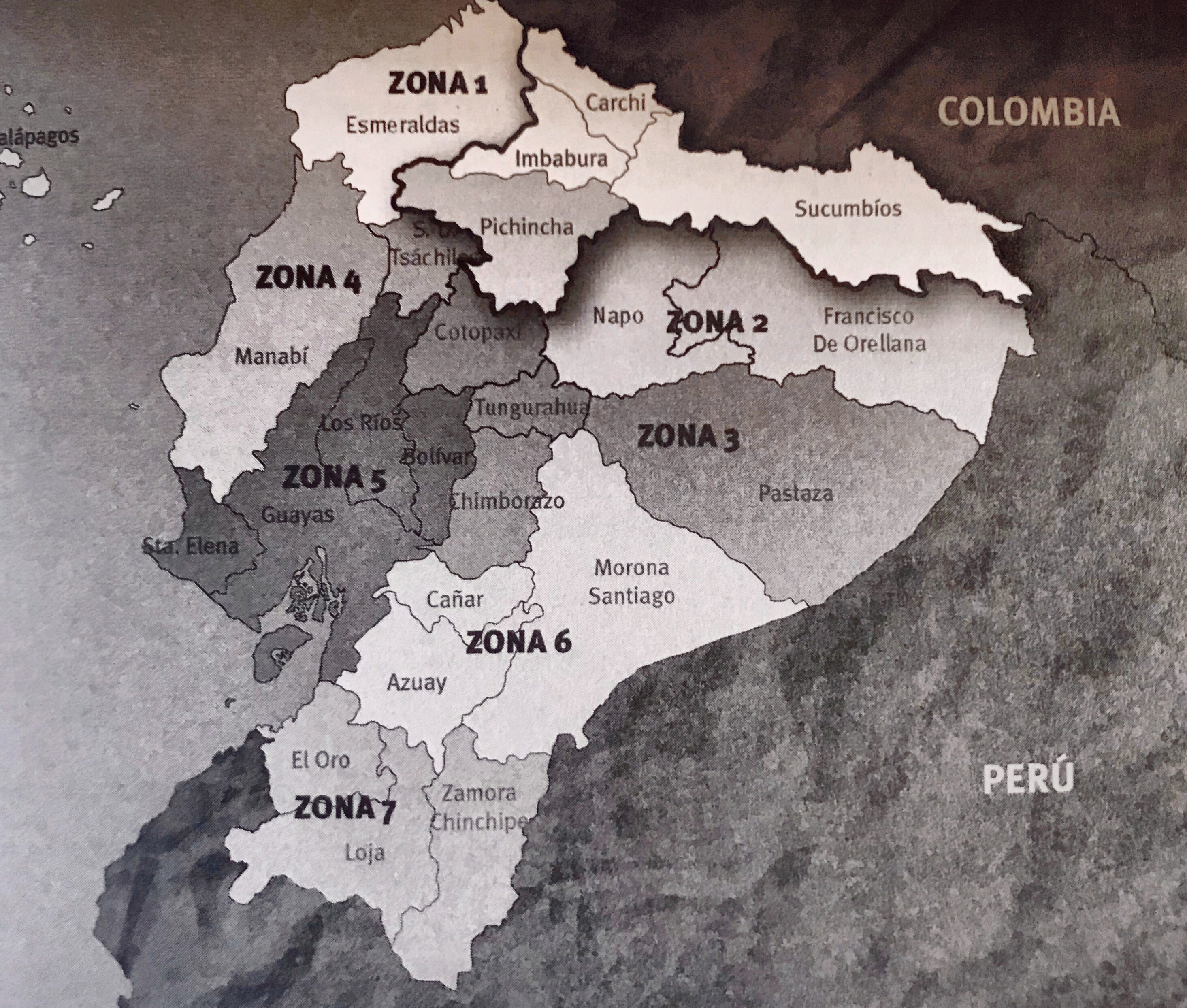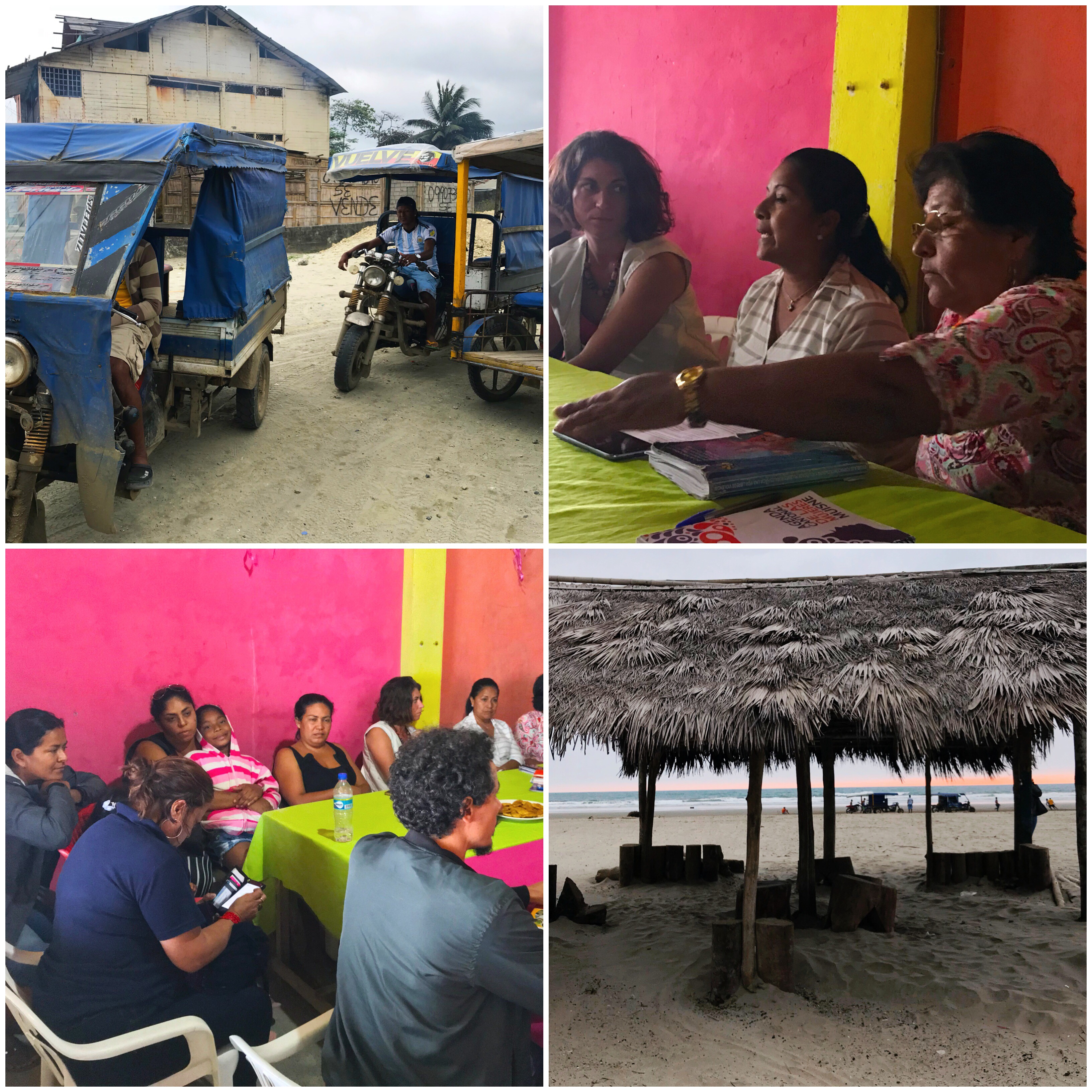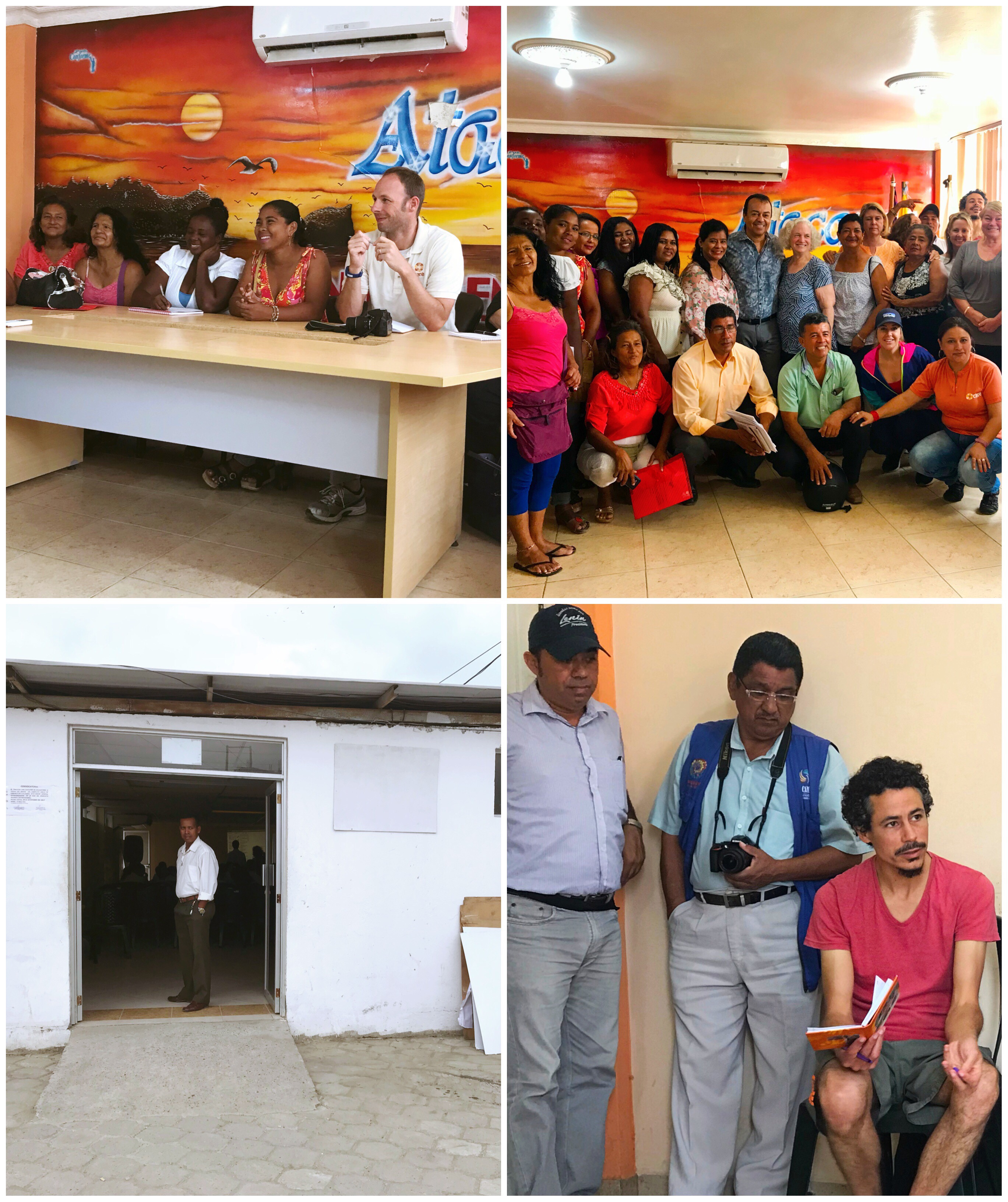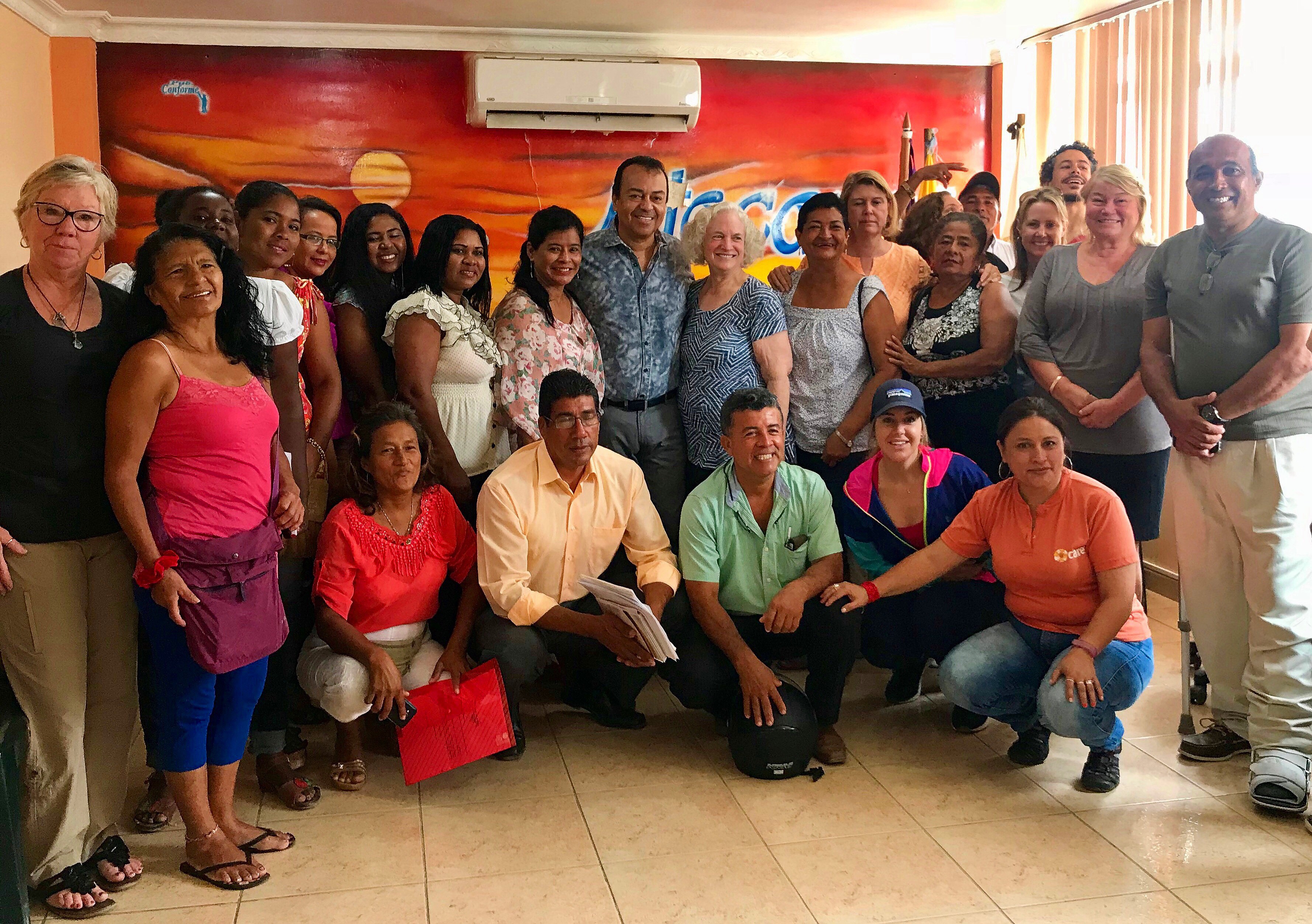In college my roommates and I often tried to do Sunday night dinners to celebrate the end of another week. That’s what our Sunday night CARE dinner felt like. After months of hearing each other’s voices and planning for this Ecuadorian Women’s Network program, we were finally face to face, and quickly making fast friends. The Chicagoans included: Mindy, Sue, Jill and Jenny. The New Yorkers included: Abby, Sheila, Michelle, Monica, and myself. Our CARE Ecuador team was made up of Nubiyah and Catalina – both based in Quito. And finally our sole male/Atlantan (originally from Ohio), Matt.
After a thorough briefing on Ecuador, we dig deeper into the country’s social norms when it comes to women, girls and gender violence issues, as well as the specific programs that we’d be visiting throughout the week. We shared stories, sipped wine and then headed to sleep to rest up for our flight out of Quito in the morning.
•••
Domestic travel proved to be a breeze, and we arrived at our first destination in Muisne via makeshift rickshaws tacked onto the end of motorcycles, for an evening with local survivors of gender violence. For context, Muisne is located near the Northern Pacific coast of Ecuador, and was hit extremely badly during the 2016 earthquake. More than 650 Ecuadorians lost their lives on April 17th, and more than 5,000 were injured. Beyond the human impact, of course, was the devastating effects that the earthquake had on tourism. Muisne is still hurting: jobs have suffered, education has suffered, and drugs, alcohol and abuse have increased tremendously.
The women’s coalition meets in a small building that sits right on the beach, with a perfect view of sunset over the ocean waves. There, in a cozy center room we huddled around a table and listened as the local women shared their struggles and tears. Of the eight women that joined us, six had left home and their husbands (along with their children) because of violence. Many women in the region simply don’t have the strength or financial independence to make that decision, and some don’t know it’s an option. So, they stay and the abuse continues.

This small but mighty team in Muisne has been working diligently to change/build upon the local law to ensure that all women understand their rights and take action against their abusers. The goal is universal – to protect women and children, to prevent abusive behaviors throughout the country, but more importantly – change the “Machismo” or macho behaviors of Ecuadorian men. It’s critical that they understand that women should be treated with the same respect and kindness as men … but this takes time. Regardless, the women of Muisne showed great hope, optimism and strength. On November 25th, 2017 a National law will be reviewed by the government to ultimately further support the need to protect women and children who are victims of violence. If the law is past, this will be considered as the first step in the right direction for all of the local Ecuadorian communities and women’s coalitions who are fighting for their rights. While there are laws in place today, they are strictly enforced — they simply aren’t enough.

Note: A theme that will come up often in these next few blog posts is local efforts to change the laws around the protection of women and children in the various regions of Ecuador. Muisne is no different, and are a part of this movement to shift legal policies. Much of the work of CARE Ecuador and these women’s coalitions hinges on the vote taking place in the next several days.
•••
The following day, we ate a traditional Ecuadorian breakfast of eggs, plantains and fruit, and then piled into our “family” van headed straight for Atacames. We made our way around dilapidated streets (that are still being repaired from the earthquake) until we pulled into a massive school-like driveway. The CARE team filed into an educational building that was painted in bright pinks, oranges, yellows and reds, and sat in a classroom-style circle ready to listen intently as each one of these hardworking men and women shared their efforts to improve the Atacames community. Together, we reviewed several strategic plans and PPT slides that provided a solid overview of the state of affairs in Ecuador (specifically Atacames) when it comes to the rights of women and children who are abused or mistreated. The theme of the day was to focus on the response protocols for gender-based violence in the area.

Ultimately, many Ecuadorian women are unaware of their legal rights as members of society. Gender-based violence is such a deep rooted issue in the country, that many women don’t even realize that laws are in place to help support them in times of need. Their children too. Much of this change starts with education and advocacy. That is what the people in Atacames are dedicated to and what they shared with via many personal stories. With lines of worry and pain on their faces, these local leaders emphasized the importance of education, spreading awareness, and the implementation and enforcement of stronger gender-based laws supporting women and children in need.
Furthermore, the community shared with us the need to the create more safe houses for women who don’t have anywhere to go. Currently, there are only five safe houses or community centers for women survivors of gender-based violence in all of Ecuador. FIVE! For a country that experiences one death every 52-55 hours due to gender-based violence, that’s downright terrifying. In order to move the needle, Ecuadorian women need safe spaces to run to in order to save their lives and the lives of their children — and they need a way to become more financially independent. After a robust group discussion, it became clear that beyond the upcoming law due for review on November 25th, Ecuador needs sustainable clinics and safe spaces for women, that also afford them potential jobs and/or internship opportunities. Bottom line: these communities need funding!

After the meeting, we gathered together for a group photo – exchanging hugs and words of encouragement. It’s a beautiful thing to see so many people from so many backgrounds and life experiences come together to share intimate moments discussing things like gender-based violence. It’s even more beautiful, though, to see these diverse people work alongside one another to create a better tomorrow and I believe CARE Ecuador is doing just that.
Next up: meetings in Ecuador’s Ancestral Territories!
Maggie, what a wonderful experience you are getting with the Care Ecuador people, thanks for sharing the process with G’ma and I – we absolutely love the whole concept behind trying to find funding to educate the women and children of Ecuador on gender violence rights and to try to build more of the safe houses, so that they have a place to go too. Amen honey – love DAd and G’ma